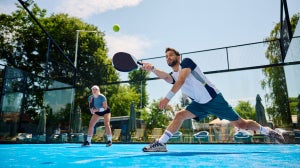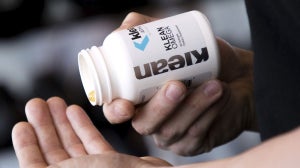

By: Heidi Harris, RD-N, CD-N, LD-N
What You’ll Learn: In this blog we will discuss how sleep and athletic performance may be related and how healthy sleep hygiene can help power your peak performance.
Powering Peak Performance Through Sleep
We’ve all likely heard the phrase, “Get a good night’s rest.” This isn’t just an empty platitude, there’s significant meaning behind this saying. Sleep is an overall healthy component of any lifestyle as it helps promote healthy wellness, hormone metabolism and even immune support.1 But, did you know that sleep and athletic performance go hand-in-hand? Physical activity has long been touted for its ability to help promote sleep quality. But, it works both ways, sleep also has been shown to help support athletic performance.2‡
Despite these benefits, research shows that many athletes fail to obtain the recommended amount of sleep which can threaten performance. Obstacles such as training schedules, travel, stress, academic demands and even over-training can affect proper sleep.2 Want to learn how you can help support your healthy sleep hygiene? Keep reading to find our why your inner athlete may want a new bedtime routine to power your peak performance through healthy sleep.‡
Sleep, Recovery & Overall Health
Sleep is an essential component of health and overall well-being.2 Along with sleep being an integral part of any athlete’s rest and recovery, research supports that increased sleep duration and quality of sleep are associated with improved physical performance and competitive success.2‡
Ultimately, sleep allows for your heart rate to slow naturally and encourages the onset of rest for your smooth muscles, allowing time for cellular and tissue repair.3 This is particularly helpful for workouts where you’ve demonstrated a high amount of physical output.‡
Needing a little extra support for muscle relaxation? Magnesium is a mineral involved in various aspects of metabolism, with key roles in muscle contraction and relaxation.4 Our Klean Magnesium provides 120mg of elemental magnesium per serving. In addition to sleep, this is another way add a little extra relaxation into your sleep routine.‡
Have you ever heard the phrase, “Let me sleep on it?”. There’s science behind this phrase too, I promise. When you sleep, you allow your brain to retain and consolidate memories. This is particularly important because as an athlete, you are constantly learning new skills, remembering new plays, memorizing new muscle movement.5 During sleep, these new skills and memories are better retained and maintained.5
Sleep & Athletic Performance
We all know how good it feels to get a good night’s sleep. In addition to this feeling of replenishment and rest, we now know that both quality and quantity of sleep help athletes improve their peak performance.2 For example, a study that measured both male and female swimmers found that those who slept for ten consecutive hours or more had faster reaction times off the starting diving blocks. Not to mention, their turn times, kick strokes and sprints were also found to be improved with longer durations of sleep.6 See? Extra snoozing time may lead to more than just a positive mood and less sleepiness during the day!‡
On the flip side, inadequate sleep has also been linked to declines in performance. You may already be aware of the effects from lack of sleep. For me, I tend to have low motivation, feel sluggish and can become a grouch if I’m running on less than 8 hours of sleep. Did you know that lack of sleep can lead to irritability, drowsiness, inability to focus or pay attention and the overall feeling of being physically exhausted?7 This is just another way that inadequate sleep and athletic performance may contribute to hindering an athlete’s peak performance.‡
A study found that male sprinters who didn’t receive adequate sleep on average had a decreased total sprint time.8 Another study found that both male and female tennis players had decreased accuracy with inadequate sleep.9 Now, imagine you’re a quarterback on a football team — inaccuracy just isn’t going to fly.‡
Another study looked at a younger population, middle and high school athletes. This study found that a lack of adequate sleep impacted their risk for injuries.10 If that was found in a younger population, you may wonder what that may mean for the older athletic individual… Instead of pondering that, I’d suggest turning down the lights and hopping into bed for a good night’s sleep.‡
So, How Much Sleep Do You Need?
That’s a great question! The answer isn’t so easy. According to the American Academy of Sleep Medicine, the average non-active adult requires between seven to nine hours of sleep for optimal performance and health. It also notes that adolescents generally require more sleep, closer towards eight and ten hours.11 However, for those who are more active, it’s been suggested that these more athletic individuals may require closer towards nine to ten hours of sleep each night. This allows for adequate recovery and adaption between bouts of exercise.11
Now, let’s go back to recovery. We talked a lot about how when you sleep, you allow your body the time and ability to recover. The hormone melatonin is a key player in helping you fall asleep.12 Research indicates that supplemental melatonin can decrease the time needed to fall asleep and support overall sleep quality. Just two sprays of our Klean Melatonin provides 3 mg of melatonin, a dose that is commonly used in clinical studies. The convenience of this travel-sized bottle means you can take it with you on-the-go!‡
The How-To’s for Healthy Sleep Hygiene
Healthy sleep hygiene may help cultivate an appropriate sleep environment to support the onset of sleep and help promote sleep quality. According to the National Heart, Lung and Blood Institute’s Healthy Sleep Guide, some sleep habits athletes may benefit from implementing into their bedtime routine include‡:
Creating a dark, cool and quiet sleeping space.13
Skip the alcoholic beverage or caffeine late in the day. Instead choose a glass of water or our Klean Hydration to help promote optimal adequate hydration.‡ This way, you can avoid disrupted sleep associated with alcohol and caffeine intake.13
Limit those electronics such as TV, cellphones and laptops before bed. These electronics can effect your circadian rhythm which in-turn may affect the quality of your sleep.13
Create a bedtime routine that helps you limit the chaos in your mind and help alleviate occasional stress during the day. Helping yourself relax for the evening may include practices such as reading, meditation or even taking a nice warm shower or bath to help you find your calm.13‡
Power-Up During the Day & Wind-Down during the Night
Have I convinced you yet to change up your bedtime routine? Sleep and athletic performance are closely related. Creating a healthy sleep routine and acquiring adequate quantity of sleep have been shown to support peak athletic performance.2 We will do our part here at Klean Athlete to provide you with the most up-to-date scientifically-backed research for nutritional supplements meant to optimize your peak performance. Now you can do your part and utilize the information we shared with you to help you optimize your sleep hygiene, encouraging you one step closer to peak physical performance.‡
References:
Spiegel, K., et al. Brief communication: Annals of internal medicine, 141(11), 846–850
Watson AM. Sleep and Athletic Performance. Curr Sports Med Rep. 413-418.
MedlinePlus: National Library of Medicine (US). https://medlineplus.gov/healthysleep.html
Siebrecht S. OM & Ernahrung. 2013 Jan;Nr. 144
Brain basics: Understanding sleep. https://www.ninds.nih.gov/Disorders/Patient-Caregiver-Education/Understanding-Sleep
Vitale, K. C., et al. (2019). International Journal of Sports Medicine, 40(8), 535–543. https://pubmed.ncbi.nlm.nih.gov/31288293/.
National Heart, Lung, and Blood Institute.. https://www.nhlbi.nih.gov/health/sleep-deprivation.
Skein, M., et al. Medicine & Science in Sports & Exercise, 43(7), 1301–1311. https://journals.lww.com/00005768-201107000-00022
Reyner LA, et al. Physiol Behav. 2013 Aug 15;120:93-6 https://pubmed.ncbi.nlm.nih.gov/23916998/
Milewski MD, et al. J Pediatr Orthop. 2014 Mar;34(2):129-33. https://pubmed.ncbi.nlm.nih.gov/25028798/
Watson, A. Current Sports Medicine Reports 16(6):p 413-418
National Center for Complementary and Integrative Health. https://www.nccih.nih.gov/health/melatonin-what-you-need-to-know
Your Guide to Healthy Sleep. https://www.nhlbi.nih.gov/resources/your-guide-healthy-sleep








